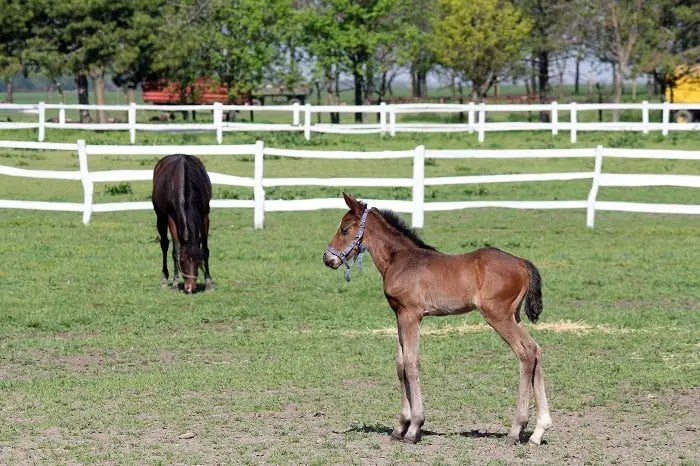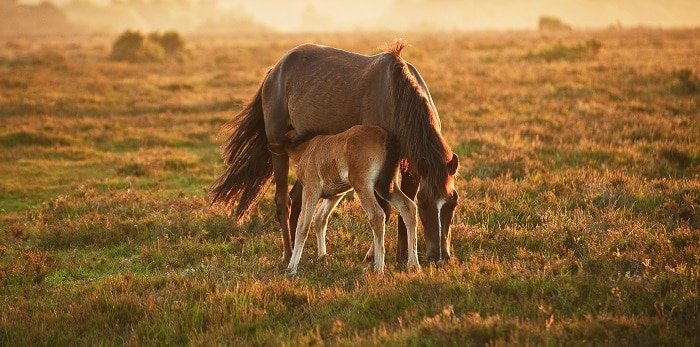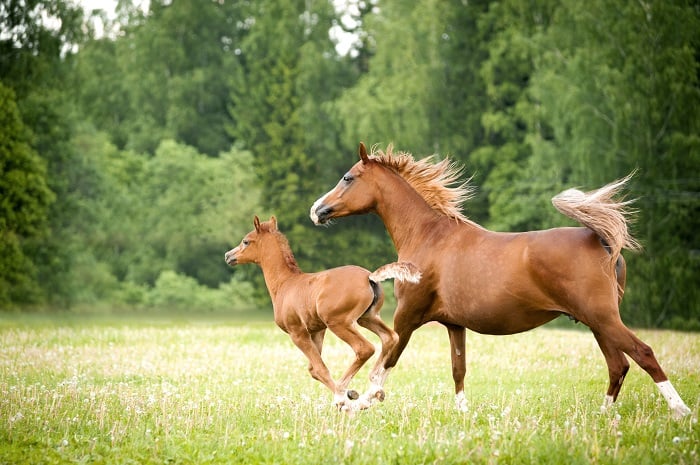Last Updated on March 31, 2023
How much do horses weigh? Horses are large animals, generally weighing anywhere from 800-2,000 pounds, depending on their breed. With being such a large animal, one may wonder: how much does a baby horse weigh?
Foals are born to be able to stand up within an hour of being born. They need to be able to run within hours of being born, as they are a risk of being prey amongst wild animals. They are born with long legs to be active as soon as possible.
How Much Do Horses Weigh? Weights of Foals
A horse’s gestation is eleven months and they are normally in labor for less than eight hours. A mare will generally give birth at night as well.
Normal birth weight of foals
Typically, a baby horse weighs 10% of its mother’s weight at birth. So, a 1,000-pound mare will give birth to a 100-pound foal, a 1,500-pound mare will give birth to a 150-pound foal and a 2,000-pound mare will give birth to a 200-pound foal. The average weight of a horse is 1,000 pounds, so most foals will weigh about 100 pounds at birth.
Even if the mare is bred to a larger stallion, the weight of the foal will still be approximately 10% of the mare’s weight. Fillies and colts often have similar weights at the time of birth.
Knowing a foal’s weight is important to be able to track its growth and health. Recording this information will allow you to give your foal the proper doses of dewormer and medication.
Find more information about What Is The Difference Between A Colt And A Foal?
Calculating Your Foals Weight: 4 Facts to Know
If you have a scale available, that is the most accurate way to weigh your foal. The foal may be nervous to get on the scale, so it may not be easy to get a good reading.
Many breeding barns will have scales that periodically track their foals’ weight with. This video shows foals that have come accustomed to scales, allowing barn staff to track their growth regularly.
Some people pick up foals and weigh themselves holding the foal and subtract their weight. However, you should be cautious using this method. Some people may not be able to safely hold the foal and may risk injury to themselves and the foal.
If you don’t have a scale available to weigh your foal, there are some other methods you can do to find its weight. There are formulas you can use to determine their weight at different stages.
For foals between 7-28 days, you can calculate your foal’s weight by measuring his heart girth, subtracting 25, and dividing the result by .07. For foals 28-90 days old you can use the same formula but add ten percent to the answer.
The formula is: Heartgirth (inches) – 25 = Weight (in pounds)/divided by 0.07
Though weight tapes can be great for figuring out adult horses’ weight, they are not always accurate for foals. It is best to avoid using weight tapes until your horse is fully grown, to avoid inaccurate numbers.
1. Quick growers
Between birth and two years of age, horses are quick growers. During this time frame, they will put on up to three pounds a day. They will be gaining height, weight, and muscle.
Genetics and environment contribute to a horse’s growth. They help determine growth patterns and play a big role in understanding what nutrition your horse will need. By the age of two, a horse will have grown about 90% of its full adult size.
2. A big appetite
Since foals grow so quickly, they require lots of nutritious food. For the first six to eight weeks of their life, foals will drink their mother’s milk. A mare will be producing an average of three gallons of milk a day.
At seven days old, a foal will drink about 25% of its weight in milk. As early as ten days, a foal may begin to show interest in solid food. By eight to ten weeks, foals will need grain and forage in their diet to achieve their required nutritional needs.
When starting to transition your foal off milk, begin feeding by following the ratio of one pound of food per month’s age or 1% of the foal’s body weight (one pound for every 100 pounds). Since foals have small stomachs, their food should be divided into two to three meals a day. They should have quality grass or hay and grain or concentrates.
They should have access to fresh water at all times. Their diets should contain vitamins, minerals, energy, and protein. It is important to consult with your veterinarian to make sure your foal is getting a properly balanced diet.
3. Weanling
A foal will be weaned from its mother at around five to six months of age. At this point, the average foal will weigh an average of 500-600 pounds. They will be eating approximately 2.5% of their body weight in grain and forage a day.
For two to three weeks before weaning, a foal’s food rations should be increased to make up for the nutrients being lost in the decrease of milk from the mare. The mare will naturally produce less milk when it is getting close to the time the foal is to be weaned.
4. Staying active
For a baby horse to be healthy, they need to be active. They should get daily exercise to maintain a good weight. However, it is important to not overwork a foal to the point of fatigue and shaking.
It is important to make sure that foals do not overeat. Overeating can lead to unhealthy weight gain that can cause a plethora of health problems.
How Much Does a Newborn Foal Weigh?
The average newborn foal will weigh around 100 pounds. However, the weight will vary based on the breed and size of the mare.
In most cases, a horse will weigh around 10% of its mother’s weight at birth. For ponies, it can be as high as 13% and for draft horses, it can be as low as 7%.
For example, a Shetland pony foal will weigh around 40-52 pounds at birth, as Shetland ponies weigh 400 pounds on average. A Thoroughbred will weigh around 100 pounds at birth and an Arabian will weigh around 90 pounds at birth. Draft horses will have the largest foals in the horse world, with a Percheron foal weighing around 140-200 pounds at birth.
While twins are rare in horses, they will typically be smaller than the average foal at birth. In some cases, one or both foals will not survive birth in the case of twins.
Twins born from an average-sized mare, weighing around 900-1,000 pounds, can weigh less than 50 pounds at birth in some cases. Due to their small size at birth, twin foals will need special care in many cases.
Some other factors can contribute to the weight of a foal at birth. For example, mares between the ages of 7-11, mares that have had one or more previous foals, and larger mares will tend to give birth to larger babies. If a mare is older or her dietary needs are not fully met, she may give birth to a smaller foal.
How Tall is a Baby Horse?
How tall a baby horse is at birth will vary depending on the size of its mother and the breed of the horse. The average 100-pound foal will typically stand 27 to 29 inches at the withers at birth. Draft horses may stand as tall as three feet, whereas ponies can be closer to 22 inches or smaller.
When a foal is born, they already have 80% to 90% of the leg length of an adult horse. While they may be wobbly on their legs at first, they generally get the hang of them within the first few hours.
Horses tend to grow quickly in both height and weight. When horses become yearlings, they will almost be at their full height. Most horses will be done growing by the age of four or five, though some draft horses may grow till they are seven years old.
Correct Terminology for Baby Horses
There are a lot of different terms in the horse world, which can make things confusing. There are even several different terms used for baby horses.
A baby horse under one year old is referred to as a foal. When a horse is weaned from its mother, which usually happens around four to six months, is known as a weanling. Once a horse turns one year old, it is known as a yearling.
A male horse under the age of four is a colt and a female horse under the age of four is known as a filly. A male horse that has been castrated is known as a gelding. Male horses will typically be gelded between six to 12 months, however, it is also not unusual for it to be done later.
How Much Does a Baby Horse Weigh? A Foal’s Weight
Knowing a foal’s weight allows one to keep track of its health, growth, and nutrition. If you know a foal’s weight, you’ll be able to provide it with a proper diet, medicine, and dewormer.
A foal at birth should weigh:
- 10% percent of their mom’s weight.
- A foal will likely be between 80-200 pounds.
Please comment if you enjoyed this article about how much do horses weigh or have any remarks regarding this post!
FAQs
How much does a 2 month old horse weigh?
A 2 month old horse would weight between 300-500 pounds.
Horses typically grow at an average rate of 1 pound per day until they are 5 years old. In the first two months, a foal will typically grow more than twice its birth weight.
A horse's weight is usually determined by its height and bone density. They grow and mature at a predictable rate, reaching their full size around the age of 5.
How much does an Arabian foal weigh?
The weight of an Arabian foal at birth can vary depending on factors such as its gender, how much time has passed since its mother was bred, and the breed’s genetics.
In general, the birth weight of an Arabian foal usually ranges from 70-200 lbs, though the average weight at birth is closer to 100 lbs. It takes around nine months for a foal to reach its full height and another year or so for it to mature in physical appearance.
Arabian foals have a slower growth rate than the average horse. They have a more refined bone structure and proportionally smaller muscle mass that can often lead to a more delicate frame. In addition, they can take up to 2 years longer before they are fully mature, weight bearing and ready for breeding.
Can a foal grow too fast?
Horses are animals that grow at a very fast rate. Their growth is controlled by their genes that are passed on to the foal. If the foal doesn't get enough feed, it will not grow as quickly as it should and may even stop growing altogether.
If the foal is fed enough, they will grow according to their genetic code and will be healthy adults. However, if they are fed too much or given supplements that promote unhealthy growth, problems can arise such as arthritis and heart disease later in life.
If a foal grows too fast, it can be detrimental to the overall health of the animal. It can lead to problems in bone development and can cause damage to joints. If a foal starts growing too fast, it will need more calories than normal - being fed an extra pound of grain each day or being given more hay.
A foal can also grow too fast if it is fed too much or does not get enough exercise. The best way to prevent your foal from growing too fast is by feeding the proper amount of food and providing adequate exercise.
How important is mare’s milk for a foal’s growth?
Mare’s milk is more than just a source of food for foals. It provides the necessary nutrients for growth and development. This includes minerals, vitamins, proteins, calcium and phosphorus - all essential to the proper functioning of the immune system, brain and muscle growth in young horses. It also has benefits in reducing gastrointestinal issues in newborn foals, improving immunity to diseases, and stimulating gastrointestinal health.
A foal’s health and growth depends on the quality of mare's milk it receives. If the mother doesn't have access to quality and nutritious feed, she won't produce nutritious milk for her baby horse. Mare’s milk has a high nutritional content and is necessary for a foal to grow healthy and strong.
Michael Dehaan is a passionate horse owner, horse rider, and lover of all things equine. He has been around horses since he was a child, and has grown to become an expert in the field. He has owned and ridden a variety of horses of different breeds, and has trained many to compete in shows and competitions. He is an experienced horseman, having worked with and competed many horses, including his own. He is an active member of the equestrian community, participating in events and teaching riding lessons.



